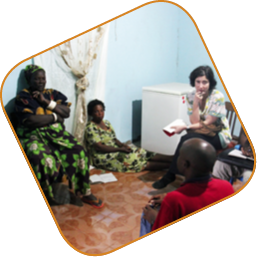3. Background to the report
Staff from the Mental Health Users Network of Zambia (MHUNZA – a membership organisation representing people who have experienced mental distress) and from the Mental Disability Advocacy Center (MDAC – an international human rights organisation headquartered in Budapest, Hungary and London, UK) had met several times at international conferences and training events. The directors of the two NGOs met each year for the past five years in Pune, India, both being faculty members on an international diploma course on mental health and human rights. In 2011 MHUNZA asked MDAC to help it conduct monitoring of human rights in Zambia, focusing on traditional healing practices.5 There were many anecdotes about what happened behind closed doors, but no documented evidence about what exactly traditional healers did to help (or in some cases exacerbate) people’s mental health issues. This was a startling data gap, given that traditional healers are the country’s frontline mental health practitioners. A long-standing supporter of MDAC in the UK kindly provided the funding for the investigation and this report.
 Photo: Eyong and Hannah interviewing a family on their use of traditional healing in a local community, Livingstone.
Photo: Eyong and Hannah interviewing a family on their use of traditional healing in a local community, Livingstone.
29 January 2014. © MDAC.
Interviewees told monitors about their experiences with traditional healers, and also reported significant abuse and neglect in their communities, and in psychiatric hospitals. The scope of the investigation was broadened to cover communities and psychiatric hospitals, a useful expansion of scope given the mental health law reform process the country is going through.
MDAC conducted visits to Zambia in November and December 2011, October to November 2012 and January to February 2014. Monitors interviewed more than 100 people in and around mental health services across the country. They visited five of Zambia’s eight psychiatric facilities, the only functional mental health “settlement centre” and various traditional healers’ clinics. In addition they carried out a review of the law and policy and a literature review to assess existing information.
This report is the result of the first human rights monitoring ever to have taken place in Zambia’s psychiatric facilities. It provides evidence of significant ill-treatment in those institutions, and should serve as a catalyst for efforts to focus investment in community-based support services. The findings of this report based on the direct observations of monitors and testimonies collected from those interviewed as part of the monitoring process. Monitors have not been able to verify every allegation made but have included information that is specific, consistent with their own observations and other people’s testimonies, and which they have deemed credible. More detail on the methodology can be found in Appendix 1.
5 The majority of studies that have explored the intersection between traditional healing and mental health issues to date have been conducted through the lens of anthropology, public health or psychiatry. Links with human rights have largely been overlooked, mentioned in passing or considered in a relativist manner [according to local interpretation of human rights]. See, for example: Atalay Alem, “Human rights and psychiatric care in Africa with particular reference to the Ethiopian situation”, Acta Psychiatrica Scandinavica, 101 (2000): 93–96.

